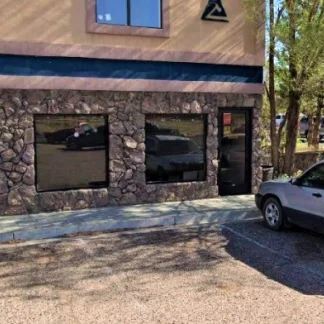Flagstaff Medical Center - Behavioral Health
Flagstaff Medical Center - Behavioral Health, located in Flagstaff, Arizona, off...
Foundation House is a drug and alcohol rehab and sober living facility in Flagstaff, Arizona. This facility provides outpatient addiction treatment and a sober living environment for adult men.
Foundation House is a safe and structured sober living environment for men in recovery. While living at the house, residents must attend all house meetings, attend an AA meeting every day, work the 12 Steps and get a sponsor, agree to house guidelines, and work, attend school, or volunteer. Residents follow a structured schedule that includes daily prayer, meditation, group dinners, Big Book study, 12-Step meetings, and house chores.
Contact us for more information: (928) 774-8845

Connect with Foundation House by calling their admissions team directly.
(928) 774-8845 Website Get DirectionsGroup therapy is any therapeutic work that happens in a group (not one-on-one). There are a number of different group therapy modalities, including support groups, experiential therapy, psycho-education, and more. Group therapy involves treatment as well as processing interaction between group members.
In individual therapy, a patient meets one-on-one with a trained psychologist or counselor. Therapy is a pivotal part of effective substance abuse treatment, as it often covers root causes of addiction, including challenges faced by the patient in their social, family, and work/school life.
Life skills trainings involve all the skills a person must have in order to function successfully in the world. These include time management, career guidance, money management, and effective communication. Truly successful addiction recovery is based on the ability to not only live substance-free, but to thrive. Life skills teaches the practical necessities of functioning in society, which sets clients up for success in life, and therefore sobriety.
In individual therapy, a patient meets one-on-one with a trained psychologist or counselor. Therapy is a pivotal part of effective substance abuse treatment, as it often covers root causes of addiction, including challenges faced by the patient in their social, family, and work/school life.
Life skills trainings involve all the skills a person must have in order to function successfully in the world. These include time management, career guidance, money management, and effective communication. Truly successful addiction recovery is based on the ability to not only live substance-free, but to thrive. Life skills teaches the practical necessities of functioning in society, which sets clients up for success in life, and therefore sobriety.
Life skills trainings involve all the skills a person must have in order to function successfully in the world. These include time management, career guidance, money management, and effective communication. Truly successful addiction recovery is based on the ability to not only live substance-free, but to thrive. Life skills teaches the practical necessities of functioning in society, which sets clients up for success in life, and therefore sobriety.
Flagstaff Medical Center - Behavioral Health, located in Flagstaff, Arizona, off...
Southwest Behavioral Health Services – Flagstaff Outpatient is a drug and alcoho...
Back2Basics Outdoor Adventure Therapy is a drug and alcohol rehab in Flagstaff, ...
The Guidance Center – East Industrial Drive is a drug and alcohol rehab in Flags...